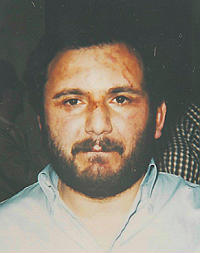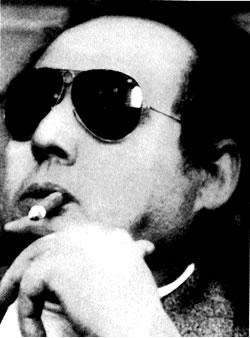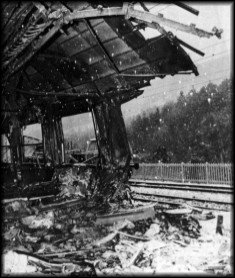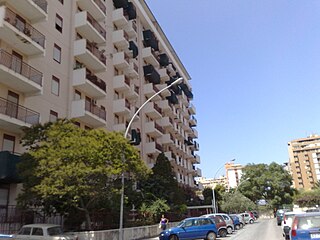
Giovanni Falcone was an Italian judge and prosecuting magistrate. From his office in the Palace of Justice in Palermo, Sicily, he spent most of his professional life trying to overthrow the power of the Sicilian Mafia. After a long and distinguished career, culminating in the Maxi Trial in 1986–1987, on 23 May 1992, Falcone was assassinated by the Corleonesi Mafia in the Capaci bombing, on the A29 motorway near the town of Capaci.

Paolo Emanuele Borsellino was an Italian judge and prosecuting magistrate. From his office in the Palace of Justice in Palermo, Sicily, he spent most of his professional life trying to overthrow the power of the Sicilian Mafia. After a long and distinguished career, culminating in the Maxi Trial in 1986–1987, on 19 July 1992, Borsellino was killed by a car bomb in Via D'Amelio, near his mother's house in Palermo.

Giovanni Brusca is an Italian mobster and former member of the Corleonesi clan of the Sicilian Mafia. He played a major role in the 1992 murders of Antimafia Commission prosecutor Giovanni Falcone and businessman Ignazio Salvo, and once stated that he had committed between 100 and 200 murders. Brusca had been sentenced to life imprisonment in absentia for Mafia association and multiple murder. He was captured in 1996, turned pentito and his sentence reduced to twenty-six years in prison. In 2021, Brusca was released from prison.

The Maxi Trial was a criminal trial against the Sicilian Mafia that took place in Palermo, Sicily. The trial lasted from 10 February 1986 to 30 January 1992, and was held in a bunker-style courthouse specially constructed for this purpose inside the walls of the Ucciardone prison.
The 2006 Malegaon bombings took place on 8 September 2006 in Malegaon, a town in the Nashik district of the Indian state of Maharashtra, some 290 km northeast of Mumbai. The Maharashtra Anti-Terrorism Squad (ATS) initially blamed the bombings on the Students Islamic Movement of India (SIMI), but in a chargesheet filed in 2013 the NIA and ATS joint investigation and involved evidences pointed towards the involvement of eight members of jihadi extremist group claiming to be from Abhinav Bharat, who were later released from charges due to lack of evidence.

Salvatore Cancemi was an Italian mobster and member of the Sicilian Mafia from Palermo. He is the first member of the Sicilian Mafia Commission that turned himself in voluntarily to become a pentito, a collaborator with the Italian judicial authorities. Cancemi made controversial allegations about the collusion of Prime Minister Silvio Berlusconi and his right-hand man Marcello Dell'Utri with the Mafia.

The Corleonesi Mafia clan was a faction within the Corleone family of the Sicilian Mafia, formed in the 1970s. Notable leaders included Luciano Leggio, Salvatore Riina, Bernardo Provenzano, and Leoluca Bagarella.

The Pizzolungo Bombing was a car-bomb attack on 2 April 1985 undertaken by the Sicilian Mafia in order to kill Carlo Palermo, a magistrate in Pizzolungo, Sicily. Palermo had been investigating an international drug and arms trafficking network in which Italian politicians may have been involved. Palermo was injured in the attack and three passersby were killed: Barbara Rizzo and her young twin sons, Salvatore and Giuseppe Asta.

Salvatore Riina, called Totò, was an Italian mobster and chief of the Sicilian Mafia, known for a ruthless murder campaign that reached a peak in the early 1990s with the assassinations of Antimafia Commission prosecutors Giovanni Falcone and Paolo Borsellino, resulting in widespread public outcry, legal change and a major crackdown by the authorities. He was also known by the nicknames la belva and il capo dei capi.

The Train 904 bombing was a terror attack which occurred on 23 December 1984, in the Apennine Base Tunnel. A bomb on the 904 express train from Naples to Milan was detonated, killing 16 and wounding 266. The bombing location was near the location of the Italicus Express bombing ten years previously.
The 2010 Pune bombing, also known as 13/7 and the German bakery blast, occurred on 13 February 2010 at approximately 19:15 Indian Standard Time, when a bomb exploded at a German bakery in the Indian city of Pune, Maharashtra. The blast killed 18 people, and injured at least 60 more, including an Italian woman, two Sudanese students and an Iranian student.
Francesca Laura Morvillo was an Italian magistrate, wife of Giovanni Falcone and victim of the Sicilian Mafia. On May 23, 1992, she, her husband and three police officers on their security detail were killed in the Capaci bombing.

The via D'Amelio bombing was a terrorist attack by the Sicilian Mafia, which took place in Palermo, Sicily, Italy, on 19 July 1992. It killed Paolo Borsellino, the anti-Mafia Italian magistrate, and five members of his police escort: Agostino Catalano, Emanuela Loi, Vincenzo Li Muli, Walter Eddie Cosina, and Claudio Traina.

A propane bomb is a type of improvised explosive device which uses commercially available bottled gas cylinders, a kind of BLEVE. The devices have been used in terror attacks and school bombing plots.

On 9 May 2017, two bombs exploded at a Big C supermarket in Pattani, Thailand. 56 people were injured, two seriously. Two men, alleged by police to be Pattani Muslim separatists, were convicted and sentenced to life in prison for the attack.

The Capaci bombing was a terror attack by the Sicilian Mafia that took place on 23 May 1992 on Highway A29, close to the junction of Capaci, Sicily. It killed magistrate Giovanni Falcone, his wife Francesca Morvillo, and three police escort agents, Vito Schifani, Rocco Dicillo and Antonio Montinaro; agents Paolo Capuzza, Angelo Corbo, Gaspare Bravo and Giuseppe Costanza survived.
The term State-Mafia Pact describes an alleged series of negotiations between important Italian government officials and Cosa Nostra members that began after the period of the 1992 and 1993 terror attacks by the Sicilian Mafia with the aim to reach a deal to stop the attacks; according to other sources and hypotheses, it began even earlier. In summary, the supposed cornerstone of the deal was an end to "the Massacre Season" in return for a reduction in the detention measures provided for Italy's Article 41-bis prison regime. 41-bis was the law by which the Antimafia pool led by Giovanni Falcone had condemned hundreds of mafia members to the "hard prison regime". The negotiation hypothesis has been the subject of long investigations, both by the courts and in the media. In 2021, the Court of Appeal of Palermo acquitted a close associate of former prime minister Silvio Berlusconi, while upholding the sentences of the mafia bosses. This ruling was confirmed by the Italian Supreme Court of Cassation in 2023.















